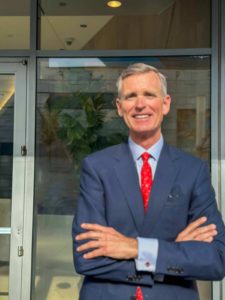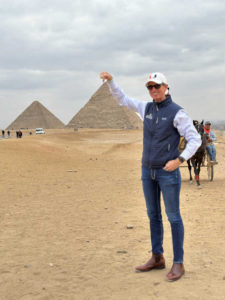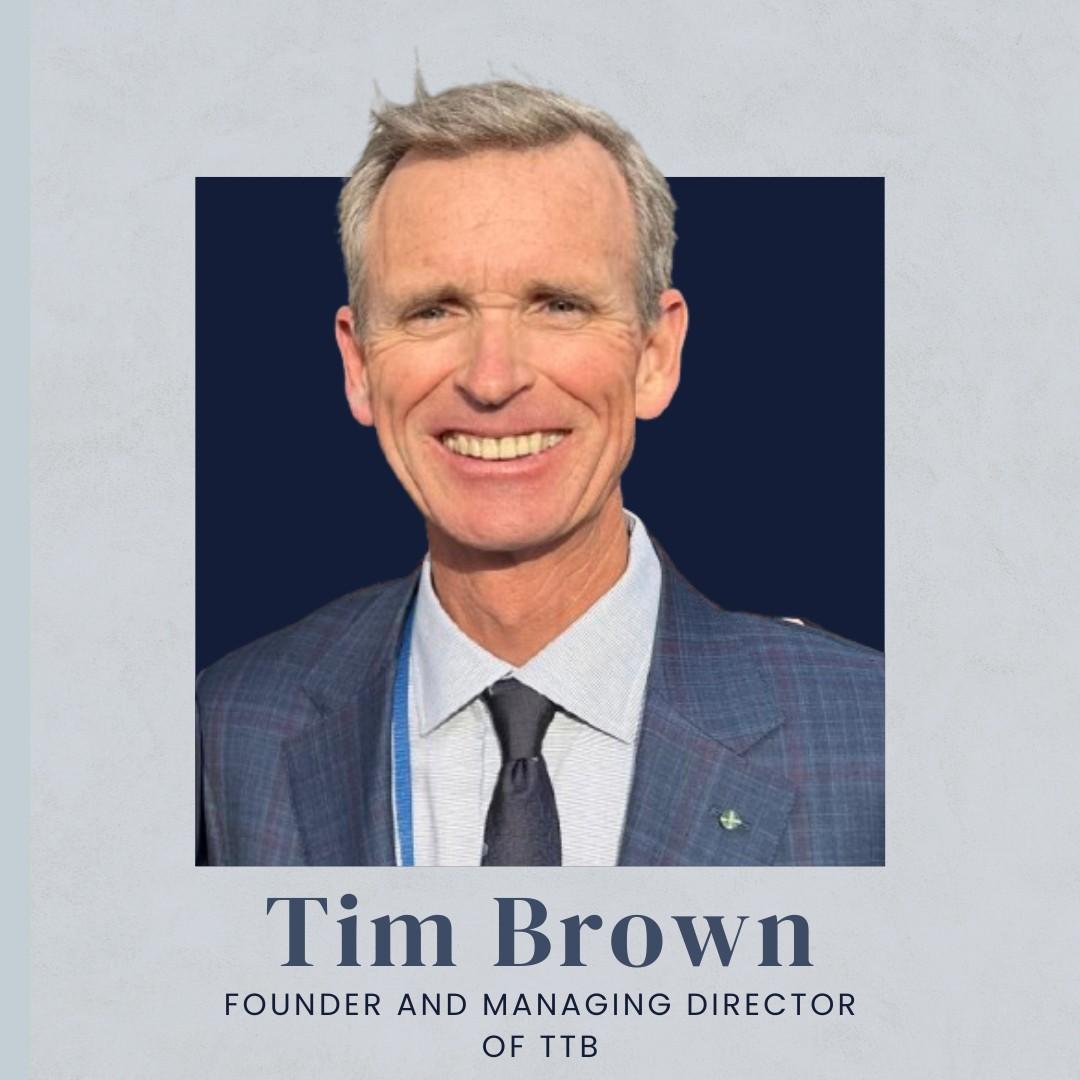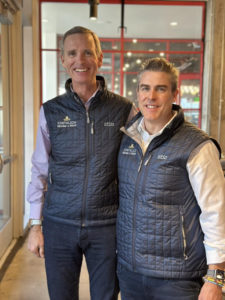CATEGORIES
Careers | Leadership and Networking | People We AdmireOverview:
- Tim Brown describes his career path as “imperfectly perfect” and wouldn’t change anything because of the joy he experiences now.
- Looking back, he wishes he could advise his younger self to let go of limiting beliefs and trust in his potential.
- Tim’s top five values are curiosity, honesty with self, humility, loyalty, and grit.
- He emphasizes owning personal values rather than inheriting them from others.
1. Please tell us a bit about your childhood and how it shaped who you are today?
As a child, I was always curious. I loved asking questions and exploring the world. I was interested in understanding the nature of things. I loved singing in the car with my mother—it was a way for us to bond.
Another thing that shaped me also ties back to my mother. She used to say, “The world doesn’t owe you anything. You can lose everything in your life except your good name. So it’s really important to always uphold your good name.”
I had many great mentors who came into my life later. At the time, I don’t think I had the awareness to fully realize how powerful they were. Many of them made an impact just by the way they showed up in my life—how they lived, rather than what they chose to say with words. I also look up to my father, who worked very hard and kept a positive outlook/attitude. He set a great example of getting up every day and being accountable–going out and earning a living.
Additionally, moving to Colorado from South Florida at the age of nine impacted me in several positive ways.

2. As someone with the experience of having taken on multiple leadership roles, what does leadership mean to you? And how have you redefined the idea of leadership throughout your career?
As we build the Fortaleza network in support of family offices, it has become the opus of my life. Leaders shape how an organization grows. I define leadership in many ways, and I think generational leadership is important. There’s an old saying, “You plant a tree for the next generation.” For me, leadership is what you do when people are watching, but more importantly, it is what you do when people are not watching.
My life has been an evolution of becoming acutely aware of the skill sets required to lead. I have observed an interesting thing in business and life: there is a difference between having a team that feels they have to do something versus having a team that wants to do something.
I believe leaders are those who ask good questions. In a lot of job interviews, people focus on one question: “Why would you want to work here?” I ask, “What would it take for you to leave this job?” I’m much more interested in that because it gives a greater overview of how somebody is wired. People leave people, not companies. In leadership, you have to have the ability to communicate in a highly proficient way. You also need the patience to ask questions and thoughtfully listen to the answers. There’s a difference between what looks wrong and what’s actually wrong, and you understand it by asking thoughtful questions.
One of the lessons I learned the hard way is that when you’re a leader and are asked “why”-based questions, you tend to shut that conversation down. Questions that start with “why” tend to put people on the defensive. So, I’m a big fan of trying to construct questions that encourage engagement and like when, what, how types of questions. I think a great leader gets people to talk on a deeper level.
Ultimately, what we’re doing in generational leadership is thinking about what we can do to pay it forward. We see the potential in people, and we want to draw that out. There are certainly many books written about leadership, but I think you need to have a servant’s heart. You need to have the ability to communicate, ask thoughtful questions and listen, and sometimes, be compassionate.
3. You have truly mastered the art of networking. Please share the importance of this and a few tips on how to build relationships.
I think the number one thing in building a network is asking, “What can I do to help you succeed in life? What can I do to ultimately serve you?” Eleven years ago I was talking to Bob Buford, the author of Half Time, a book that impacted millions of lives while Bob was alive (and continues to do so today). I asked him, “Will you please help me understand what’s the most important thing to you when you’re talking to leaders around the world.” He said, “I like to end every conversation by asking them, ‘Is there anything I can do to help you? Is there anything I can do to serve you?’”
The assistance you give others may not always come back to you; it’s not a one-for-one exchange. But that’s not the reason you do it. What ends up happening is that as you’re out helping others be successful, other people are watching you, trusting you more, and your network and communities expand naturally.
I think it’s important for your network to trust you, know that you’re competent, and see that you’re willing to help them be successful.
Whether we realize it or not, in every conversation and interaction we have, people either trust us more or less (whether consciously and/or subconsciously). When building a network, it’s important to be thinking about your values and how you ultimately show up in the world. When you see how people show up in the world—you can also better predict future patterns of behavior.

4. If you could have dinner with a famous historical figure, who would it be and why? What would you ask this person?
There are so many individuals I would enjoy meeting and conversing with. But I would go back in time and meet my mother. She died at a young age, and I don’t think I ever really got to know her as a mature adult. When I think about how much she guided my life, I feel like it was a huge missed opportunity. I would be very interested in hearing more about her life because I think she was always selflessly giving to me. My awareness at the time was too selfish to truly spend enough time understanding her. I still think about it a lot, but I have realized that you can’t change the past—you can only change how you feel about it.
Among historical figures, if I could go back and meet anyone, it would probably be Winston Churchill. Churchill’s calmness under adversity and the way he reassured others simply by how he showed up in the world was admirable. I have a tremendous amount of respect for him. I also admire Margaret Thatcher and Ronald Reagan.
5. What were some of the biggest challenges you faced in your career, and how did you overcome them?
I think there’s a mindset we often have in life that our path will be linear. We’ll start elementary school, join high school, then go to college, get a job, move up the ranks, start a family, and have everything progress smoothly. The expectation is a straightforward, upward trajectory. I certainly used to believe that was how life had to happen. But life is imperfect. When I think about how I used to frame my story as a human being, it was in a way that didn’t allow for mistakes or the growth that comes from them. Life is ultimately neutral and we get to decide how we’re going to hold every experience – for our upliftment or to hold us back. Life leaves that one to decide.
In Dead Poets Society, Robin Williams tells his students, “I’d like all of you to get on your desks, and I want you to change the perspective you’re using to look at the room.” I think the same applies to any challenge we face. When we continue to view things two-dimensionally, we create an echo chamber and get trapped in the same patterns. But when we step back and gain a broader perspective, we can see how things connect differently and find better solutions. Someone once asked me “what’s the definition of success.” I thought about it for a while, provided some answers that didn’t quite get there. He then said, “success is when Plan B works.”
‘’I believed my path would be linear—I thought I would become a successful CEO, make a lot of money, and be well-respected as a business leader. I defined success by how businesses performed and the wealth they created. But when I experienced a significant business failure, I had to completely rebuild my personal operating system. If that hadn’t happened, I wouldn’t be who I am today’’-Tim.
We can plan all we want, but life unfolds in its own way.
6. If you could go back and do one thing differently in your career, what would it be?
In reality, my path has been imperfectly perfect. I’m not sure I would go back and change anything because I have so much joy in the life I live today because of the perspective it’s built —I am truly myself. My story is also still being written.
But to answer your question, there was a point in time when I had the opportunity to truly bet on myself as a leader and build a new company. What I didn’t realize until about two years ago was that because of the business failure I experienced in 2009, I had not fully/100% trusted my ability to lead. It took years to heal and reach a place of true confidence.
‘’Now, looking back, I realize that the vehicle I was in couldn’t have side mirrors or a rearview mirror anymore. All that mattered was the present and the future—where I was going. The past was irrelevant other than the learning experiences that make us better. If I was going to bet on myself as a leader, I could never look back again. But I had to trust myself. I had to be in a relationship with myself at a level that allowed me to be the healthiest version of Tim Brown possible’’- Tim.
So, if I could do one thing differently in my career, I would go back in time and talk to the younger Tim Brown of the mid-2000’s and early 2010’s. I would say, “Look, you have to break out of this mindset and the story you’re telling yourself. It’s an unhealthy narrative, and it’s going to hold you back for years. That makes me sad because ahead of you is an amazing story—bright sunsets, incredible sunrises, wonderful people, and so much joy. You just have to keep moving forward, and you’ll find it.”
For whatever reason, it all clicked for me two years ago when I finally decided to fully lean in and manifest what I was put on put on earth to do. Mark Twain wrote, “The two greatest days in a person’s life are the day you’re born and the day you figure out why.” I’m doing exactly what I was born to do.

7. What are your most important values, and how have they contributed to the progression of your career?
My top five values are curiosity, honesty with self, humility, loyalty, and grit—grit being the value you show when you get knocked down nine times and get up ten.
I value the ability to have grit, to get back up, and to know that anything worth doing takes effort. So much of what we do in life requires that. We are nothing without the values that we define for ourselves. Everyone drifts at times. It often happens when you’re not in alignment with your values. Understanding your values—ones that are not your parents’ values or someone else’s expectations—is important. It’s about realizing what they are, living by them, and having the ability to say no to things that don’t align with them.
8. Was there any particular section of your book, Jumping into the Parade, that was the hardest for you to write?
All of it. When you write something like that, you are not just putting yourself out there—you’re also bringing in your whole family. You’re involving your children, whether they want that or not. I had to be very vulnerable. I didn’t even realize until after the book was finished just how much of an impact it might have on my son.
Writing about an incident at the Bentley Hotel when I contemplated the unthinkable was especially difficult. I went back for the fifth anniversary of that night in November 2016. I entered the hotel, returned to the same floor, and faced that fear.I had to lean into it and see it again. I realized that just 200 feet away was an incredible hospital specializing in cancer treatment, particularly breast cancer—saving lives. My mother died from breast cancer. The whole time, I thought I was in this dark place, but only 200 feet away was a place of hope, a place that changes and saves lives. It had been right there the whole time.
I think I also underestimated all the moving parts (and grit) that it takes to write a published book. I handed my manuscript to Debbie, who edited both of my books, thinking I was finished. I asked, “When are you guys going to publish it?” I remember her saying, “What are you talking about? You’re far from done. I’ll let you know when you’re done.” She told me, “It’s not an A, and I don’t put out work that’s not an A.” So, I had to rewrite all the chapters and sit down with her to refine them. Debbie was the best editor I could have ever hoped for. She really took the quality from a C+ to an A (as she said from day one), but we had to dig in and do the work to get it there.
9. What is your favourite book?
Awareness by Anthony de Mello. It is not a book for the faint-hearted because it is unfiltered. It changed my life, and I’ve probably read it 25 times. I think another outstanding book is The Purpose-Driven Life by Rick Warren. It takes complicated concepts and makes them easy to understand and practice.
Conclusion:
Tim Brown’s reflections on leadership, personal growth, and the lessons learned from both success and failure show what living with purpose means. His story reminds us that setbacks don’t define us—how we rise from them does.



